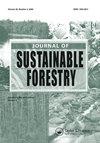REDD+: The Opportunity for Sustainable Management in Zagros Forests
IF 1.8
4区 农林科学
Q3 FORESTRY
引用次数: 0
Abstract
ABSTRACT The Reducing Emissions from Deforestation and Degradation (REDD+) projects aim to prevent deforestation and greenhouse gas emissions as a policy to combat climate changes. This article evaluates changes to the Zagros’ Forest cover in 20 years and predicts the implications of implementing the REDD+ project in the next two decades. Using Landsat Forest cover maps and a logistic regression model the potential for forest cover transfer to non-forest regions was modeled to identify regions at risk of deforestation. A Markov chain was implemented to predict the changes. Receiver Operating Characteristics (ROC) was employed for validation, and the Voluntary Carbon Standard (VCS) was utilized to model the REDD+ project baseline to predict the forest cover changes. The findings indicate, 37,809 hectares of forest cover were lost in the past 20 years and with this trend, the amount of greenhouse gas emissions will increase. However, implementing the REDD+ project can prevent the release of 1,714,534.13 tCO2e. Therefore, this deteriorating forest possesses the potential to reduce CO2 emissions by preventing deforestation, identifying deforestation-prone areas and implementing the REDD+ project utilizing the methodology presented. Climate change mitigation, carbon sequestration, and biodiversity protection are just a few of the benefits of REDD+ projects that can aid sustainable forest managementREDD+:扎格罗斯森林可持续管理的机遇
摘要减少森林砍伐和退化排放(REDD+)项目旨在防止森林砍伐和温室气体排放,以此作为应对气候变化的政策。本文评估了扎格罗斯森林覆盖率在20年内的变化,并预测了在未来20年实施REDD+项目的影响。利用陆地卫星森林覆盖图和逻辑回归模型,对森林覆盖转移到非森林地区的潜力进行了建模,以确定有毁林风险的地区。实现了一个马尔可夫链来预测变化。采用受试者操作特征(ROC)进行验证,并采用自愿碳标准(VCS)对REDD+项目基线进行建模,以预测森林覆盖变化。研究结果表明,在过去20年中,森林覆盖面积减少了37809公顷,随着这一趋势,温室气体排放量将增加。然而,实施REDD+项目可以阻止1714534.13 tCO2e的释放。因此,这种不断恶化的森林具有通过防止森林砍伐、确定森林砍伐易发地区和利用所提出的方法实施REDD+项目来减少二氧化碳排放的潜力。减缓气候变化、固碳和生物多样性保护只是REDD+项目的几个好处,这些项目可以帮助可持续森林管理
本文章由计算机程序翻译,如有差异,请以英文原文为准。
求助全文
约1分钟内获得全文
求助全文
来源期刊

Journal of Sustainable Forestry
Social Sciences-Geography, Planning and Development
CiteScore
3.90
自引率
12.50%
发文量
42
期刊介绍:
Journal of Sustainable Forestry publishes peer-reviewed, original research on forest science. While the emphasis is on sustainable use of forest products and services, the journal covers a wide range of topics from the underlying biology and ecology of forests to the social, economic and policy aspects of forestry. Short communications and review papers that provide a clear theoretical, conceptual or methodological contribution to the existing literature are also included in the journal.
Common topics covered in the Journal of Sustainable Forestry include:
• Ecology, management, recreation, restoration and silvicultural systems of all forest types, including urban forests
• All aspects of forest biology, including ecophysiology, entomology, pathology, genetics, tree breeding, and biotechnology
• Wood properties, forest biomass, bioenergy, and carbon sequestration
• Simulation modeling, inventory, quantitative methods, and remote sensing
• Environmental pollution, fire and climate change impacts, and adaptation and mitigation in forests
• Forest engineering, economics, human dimensions, natural resource policy, and planning
Journal of Sustainable Forestry provides an international forum for dialogue between research scientists, forest managers, economists and policy and decision makers who share the common vision of the sustainable use of natural resources.
 求助内容:
求助内容: 应助结果提醒方式:
应助结果提醒方式:


